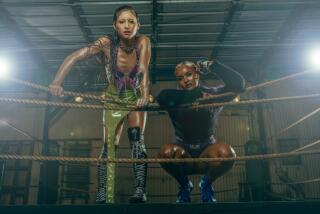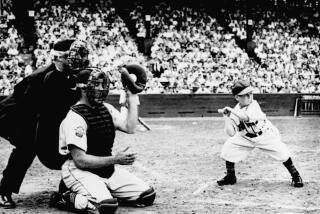Chuck Davey, 77; Boxer With Clean-Cut Image Was Brief Sensation on Early TV
- Share via
Chuck Davey, a former welterweight boxer whose handsome face and squeaky-clean image made him one of television’s first sports stars when the medium was in its infancy half a century ago, died Dec. 4 at 77.
Davey, who had been paralyzed since breaking his neck in a 1998 body surfing accident off the coast of Costa Rica, died at his Birmingham, Mich., home.
In a sport in which participants often found as many fights and as much trouble outside the ring as they did within, where vocabularies were liberally sprinkled with references to dem and dos, the clean-cut, articulate Davey was a brief sensation.
Born Charles Pierce Davey in Detroit, he not only became a college graduate, a rare achievement for a boxer, but stayed on at Michigan State to pursue a master’s degree while also pursuing opponents in the ring. Davey eventually received the degree in school administration.
Behind the brains, there was plenty of brawn. Using a southpaw style that often confused and frustrated opponents, Davey won an NCAA title as a freshman after entering Michigan State at 17. After four years of duty in World War II, he returned and won three more NCAA championships, finishing his amateur career with 93 victories in 94 fights.
Today, such a record would immediately catapult a fighter into the spotlight, promoters waving millions under his nose with promises of immediate exposure and title shots soon to follow. But in those days, with only one title in each weight division and a long waiting list, fighters often worked the brutal craft for years in obscurity, sometimes never getting a big opportunity.
Davey got his in 1952 after going 30-0-1. He was signed to fight on television against former lightweight champion Ike Williams, who had moved up to welterweight.
“I was scared,” Davey later told The Times. “I was nervous, and I knew this might be my one chance to make some money in boxing.”
Until that chance came along, Davey had been considering retirement. Instead, he beat Williams on a fifth-round knockout.
As Davey continued to ply his trade on TV, the audience learned that he called his mother after every fight, was a regular churchgoer and didn’t smoke or drink.
A star was born.
He went on to beat Rocky Graziano and get a draw and a decision against Carmine Basilio.
In 1953 Davey fought the match for which he is most remembered, a welterweight title fight against Kid Gavilan, the Cuban star. Davey was a 3-1 underdog and, as it turned out, rightfully so. Gavilan knocked him down three times in the ninth round; Davey didn’t come out for the 10th.
He fought once in Los Angeles, losing to Art Aragon in 1954, before retiring later that year after having suffered four of his five career defeats in his final five fights. Davey wound up with a 40-5-2 record, including 26 knockouts.
After he had hung up his gloves, a United Press International story summed up his career in a harsh light: “Davey, the wavy-haired welterweight from Michigan State, wound up as a victim of the instrument that made him -- television. Until another one like him comes along, Davey will be remembered as the horrible example of a TV buildup. The truth came as quite a shock when it was proved that Chuck wasn’t as good as he looked on the picture box.”
Davey went on to become a millionaire in the insurance business, a Michigan boxing commissioner and the president of the U.S. Boxing Assn.
He is survived by his wife, Pat, nine children and 25 grandchildren.
More to Read
Go beyond the scoreboard
Get the latest on L.A.'s teams in the daily Sports Report newsletter.
You may occasionally receive promotional content from the Los Angeles Times.










